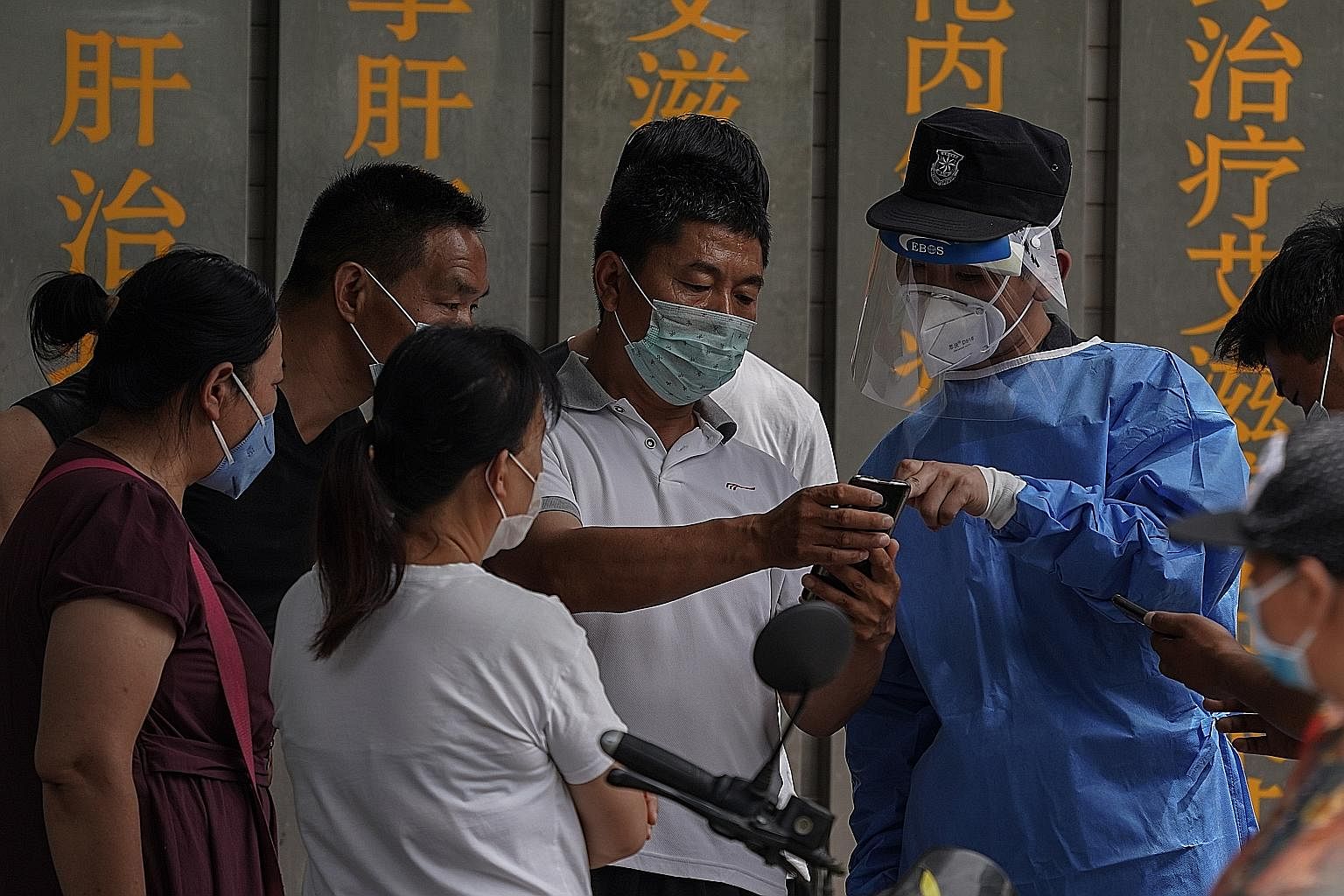News analysis: Coronavirus pandemic
Chinese capital keen to avoid lockdown amid new infections
Sign up now: Get insights on Asia's fast-moving developments
Follow topic:
After nearly two months of no new local virus infections, a new cluster has shown up in a Beijing wholesale market with at least 79 confirmed infections linked to the location.
Cases with connections to the Xinfadi market have been picked up in neighbouring Hebei and as far as north-eastern Liaoning province, nearly 700km away.
While the authorities have shut the Beijing market and locked down estates around it, the government appears to be trying to avoid the full-scale lockdowns of earlier this year that brought the country - and its economy - to a grinding halt.
The Beijing authorities have been keen to keep the city of 20 million calm, with various state media editorials and government officials saying that people should "heighten alert but not panic".
"We must avoid the new local epidemic from affecting the resumption of work and production," the nationalistic tabloid Global Times wrote in an editorial yesterday.
Yet there are indications of the severity of the situation. By the end of yesterday, 12 more districts had raised their risk level to "medium", taking the total number of at-risk areas to 22. Only one district, Fengtai, site of the Xinfadi market, is classified high risk.
Another 10 residential estates surrounding a second market - Yuquandong - in west Beijing have also been put under lockdown after infections in people working there. They had previously visited the Xinfadi market.
While Xinfadi is about 18km from Beijing's political and cultural heart, the fact that it is responsible for close to 80 per cent of fruit and vegetable supplies means that hundreds visit the market daily.
Each one of them is a potential virus vector - that cases have surfaced in eight of Beijing's 16 districts is important to note - and it is no surprise officials are now going from door to door to check for past visitors to the market.
The emergence of an outbreak, in the capital no less, poses one of the biggest challenges to China's handling of the virus, which had been largely put under control.
It also raises the question of how much, exactly, is enough?

People who visited Xinfadi market or live near it using their mobile phones to make an appointment to be tested for Covid-19 at Youan Hospital in Beijing yesterday, after a spate of infections were linked to the market.
PHOTO: EPA-EFE
While the country has undergone strict lockdowns of varying degrees, Beijing has been far more stringent, requiring visitors to serve a two-week quarantine as recently as last month, with schools and gyms reopening only this month.
International flights are still being diverted to a third airport for health screenings before passengers can re-board to Beijing.
There has been a dizzying flow of information, with new websites sending multiple push alerts every hour to keep residents abreast of developments while lists of neighbourhoods where infected patients live are updated daily.
Recently reopened gyms have been shut again and restaurants are urged to practise social distancing.
But some in the hospitality industry say they are facing another hit after being told to stop selling salmon as a precautionary measure while others say they have to stop selling imported seafood too.
"Some of the best produce might not be from China, so surely we have to import things like lobsters and razor clams," said the owner of two Cantonese restaurants who declined to be named.
"I guess now we'll just have to wait and see how things go. It's like we took three steps forward and two steps back."
The authorities also appear keen to avoid another lockdown, which was how they dealt with outbreaks last month in cities near the Russian border.
Nearly a month of shutdowns from earlier this year resulted in China's first ever contraction in its quarterly gross domestic product, and no growth target was unveiled last month at annual parliamentary meetings.
Instead, a raft of measures to boost the economy and encourage consumption was announced, a hint of the headwinds to come.
Then there are also concerns about wet markets - usually bustling, crowded and sweaty places that easily facilitate the spread of disease.
But this could be because of an individual's personal hygiene rather than the produce that is carrying the virus, noted Dr Wu Zunyou, chief epidemiologist at the Chinese Centre for Disease Control and Prevention.
China's initial coronavirus cases were discovered at a wholesale market in Wuhan, which had also sold wildlife for consumption.
Chaoyang district, an area that includes the central business district, has voluntarily tested merchants and staff at over 40 markets selling agricultural produce, livestock and seafood.
But epidemiologist Benjamin Cowling from the University of Hong Kong said wet markets might not be the "most risky" of all locations.
The cases in Wuhan were picked up because they were linked to the market but scientists increasingly believe those infections might not have passed from animals to humans, said Professor Cowling, who specialises in epidemiology and biostatistics.
"In Beijing it is possible that there are now handfuls of infections in other parts of the city, including some linked to the market outbreak and perhaps others from different sources," he told The Straits Times.

